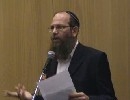Beit Midrash
- Family and Society
- Current Events
The long and painful era of Jewish exile was not so much a time of building societies in the Jewish world as it was simply a time of struggling survival. As such it required special mechanisms and social pressures to maintain a semblance of organized Jewish life. But to a great extent, especially here in Israel today but perhaps even in large areas of the current Jewish Diaspora as well, these mechanisms, tools, policies and outlooks are no longer really productive or relevant. The era of nation building cannot rely on bans, pronouncements and impractical policies that may have had validity in a different era but are no longer effective in another era. The Torah and its halachic standards do not change with the whims and current fashions of the time. But attitudes, goals, and policies to create a Torah nation and physical entity do change and change they must. People quote often personal opinions - not Halacha - of great leaders of the past on societal matters and attempt to make them the law today as well - to elevate them to the level of Halacha. My feeling always has been and is as follows: How do I know what these great people would have said had they lived toady under the circumstances of Jewish nationhood, after a Holocaust, and in the face of the modern interconnected world? Is it not slightly arrogant to think that a different era entirely would somehow not have brought different responses to social and national problems, none of which are covered in the field of Halacha itself?
It is hard to identify eras when one is currently involved in one. They are best seen in retrospect with the perfect hindsight of history and past experiences. It orders us to analyze and understand the tears - eras - of every generation separately. Yet the Torah also bids us to be aware of the fact that eras change and that time is not frozen. The tasks set before every generation may be the same in broad scope but certainly differ in nuance and detail. The task of building a Jewish society here in the Land of Israel is the same as it always has been but the circumstances of having to do so are not those of 1948 let alone of 1897. The adjustment to that reality has been a most difficult one for all sections of the Jewish people. We do not recognize clearly the demarcation line which separates one era from the next. But surely that line does exist and more importantly an attempt must be made to recognize it and deal with it. The secret of the Jewish world that has allowed it to survive has been its resilience and practicality combined with faith and tradition. We have navigated many eras of change successfully and basically we have remained the same and true to our original identity and purpose. I am certain that this will be the case regarding our current era as well.
On Memory and Disengagement
Rabbi Yechezkel Frenkel | 5754


























